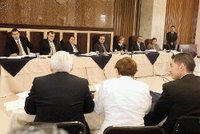 In Costa Rica: Court to determine constitutionality of marriage for same-sex couples (April 26, 2006), I said that the Costa Rica's Constitutional Court would be holding an open hearing on May 4th to determine if attorney Yashin Castrillo had the right to challenge the constitutionality of language banning recognition of civil marriage for same-sex couples in the country's family code (which says "It is legally impossible matrimony:... 6) Between persons of the same gender").
In Costa Rica: Court to determine constitutionality of marriage for same-sex couples (April 26, 2006), I said that the Costa Rica's Constitutional Court would be holding an open hearing on May 4th to determine if attorney Yashin Castrillo had the right to challenge the constitutionality of language banning recognition of civil marriage for same-sex couples in the country's family code (which says "It is legally impossible matrimony:... 6) Between persons of the same gender").On May 5th, Diario Extra reported that the seven members of the court sat in absolute silence for two hours while arguments were aired - pro and con - and left without asking a single question.
The paper says that both sides claimed victory after the hearing.
On the side of those arguing that the ban was unconstitutional, Castrillo argued that Costa Rica had to observe international human rights treaties and remove legislation that established limits on equality, liberty expression and emotions: "Today," he told the judges, "it is your turn to judicially recognize that every human being deserves dignity and respect."
Also according to the paper, fellow attorneys Marco Castillo and Rose Mary Madden Arias challenged religious arguments that fomenting procreation was the sole purpose for civil marriage as an institution.
On the side of those arguing that the discriminatory language should remain in the family code, Costa Rica's General Attorney Fernando Castillo argued that the Constitutional Court did not have the standing to determine the constitutionality of banning marriage for same-sex couples and that the language could only be removed by adopting a new constitution. "You cannot claim a right if it has never been given," Castillo argued, "and the Court is blocked from imposing it."
Jorge Fisher, an Evangelical preacher who also testified during the hearing, said "we cannot an institution that was born in God's heart and change it."
Reporter Oscar Rodriguez sates that it's not likely that the Court will simply reject Yashin Castrillo's arguments by throwing his "action of unconstitutionality" out of court but that it might agree with the General Attorney's office that the Court is not able to rule on the issue; or find that while the family code might violate the rights of a minority, the Legislative Assembly is in its rights to establish such violation; or, finally, rule that the Court can rule in the case and does establish that the rights of a certain minority have been violated. "From that moment on," Rodriguez writes, "the State would be obligated of accepting these type of unions."
Diaro Extra had previously reported that the Court would have a month to announce their ruling, although the paper also said that in some circumstances, the court could ask for additional time.
A detail that surprisingly gets left out of most articles I have read on this issue: In an interview shown on a Costa Rica television news station (which was available on the day of the hearing but no longer online), Mr. Castrillo spoke openly about being gay and the fact that he filed his challenge to court after he was denied a license to marry his partner.
UPDATE: Costa Rican court ratifies same-sex marriage ban (May 24, 2006)















No comments:
Post a Comment